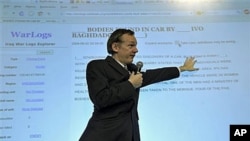U.S. Defense Secretary Robert Gates says the release of thousands of classified documents by the WikiLeaks website is embarrassing but is not having a big impact.
Gates told reporters in Washington Tuesday the leaked diplomatic cables have had only, in his words, "a fairly modest" impact on relations with other countries.
Officials said Tuesday that the U.S. State Department has cut off the military's access to its database of diplomatic cables in an attempt to prevent future leaks.
Officials suspect a former intelligence analyst with access to the military's classified network ((known as SIPRNet, or the Secret Internet Protocol Router Network)) was the source for the leaked documents.
Secret U.S. diplomatic cables published by the WikiLeaks website Tuesday reveal that most of the 200 U.S. tactical nuclear weapons based in Europe are located in Belgium, the Netherlands, Germany and Turkey.
The countries have long been suspected of housing the warheads, but the leaked cables appear to be confirmation of that information.
A NATO spokeswoman told VOA Tuesday the leaking of any classified information, diplomatic or military, was "illegal, irresponsible and dangerous".
Oana Lungescu declined further comment saying that as a matter of policy NATO did not comment on classified information.
Other U.S. diplomatic cables leaked by WikiLeaks say Afghan President Hamid Karzai freed detainees without trial in Afghanistan because they had powerful connections.
Afghanistan has not commented on Tuesday's disclosure.
The United States has condemned the WikiLeaks release of more than a quarter-million sensitive U.S. diplomatic cables.
The website has not identified the source of the documents. A U.S. Army intelligence analyst, Bradley Manning, was arrested earlier this year and is in military custody awaiting trial for allegedly leaking a 2007 video of a helicopter strike in Iraq and classified diplomatic cables to WikiLeaks.
US Defense Secretary Downplays WikiLeaks Impact




